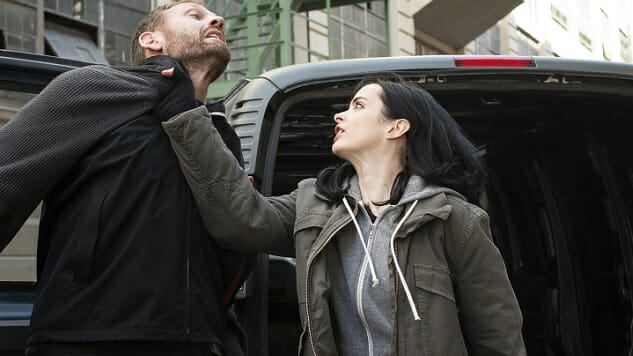
Daredevil and Jessica Jones: One of these things is not like the other. You’d expect there to be a shared mentality between these two shows as far as action is concerned; they’re Marvel’s first two moves in the ever-expanding Netflix sandbox, and the building blocks of their “street-level” comic book brand, which will continue building with Luke Cage and Iron Fist until it’s time for The Defenders. Basically, we’re talking the gritty and depressing version of The Avengers, and while Daredevil and Jessica Jones share grimy, smaller-scale qualities in common, the former is more inclined toward action while the latter boasts a roundly procedural focus by comparison.
But when the protagonist of your series has super strength and the power of flight (or, in her own words, “guided falling”), you occasionally have to hold off on the sleuthing and let her throw down. The bar fight in “AKA Crush Syndrome” has already outlined the differences between Jessica Jones’ approach to action versus Daredevil’s: Jessica isn’t an agile martial artist. She’s a meat and potatoes kind of gal when it comes to fisticuffs, the sort who punches inelegantly and tosses dudes aside like sacks of meat as they rush at her. It isn’t pretty. It isn’t refined. But it gets the job done, and as far as she’s concerned, that’s all that matters. As Jessica, Will, and Trish all lie beaten after their failed snatch-and-grab on Kilgrave in “AKA The Sandwich Saved Me,” though, you might expect her to reconsider her technique.
The rest of the episode opens up Jessica Jones in a few key ways. Most prominently, we get to see Jessica in her early days, before she got mixed up with Kilgrave. Trish had plans for Jessica, even going so far as to whip up a costume and pick a pseudonym for her. (It’s the series’ most overt nod to its comic book roots. Fans of the source material may squeal with delight at the sight of that outfit and the mere mention of “Jewel,” which does, in fact, sound like a stripper name.) Jessica has been an investigator from the start, as we see in her epic, peak-Ritter exit from her terrible day job; she has a knack for picking out errant details. Clearly being a PI isn’t something she had to grow into very much. It’s in her nature to detect, just as much as it’s in her to show up frat boys in business attire who think it’s their right to sexually harass Trish. (Watching Kilgrave get his comeuppance in Jessica Jones’ climax will be satisfying, but perhaps not half as satisfying as it is to see Jessica embarrass Trish’s “fan” in front of his bros.)
Better days, those. Now she’s working on releasing Malcolm from the influence of both Kilgrave and heroin. Unsurprisingly, crippling drug addiction enslaves just as easily as Kilgrave himself, though the limitations on chemical dependency appear to be nil compared to his mind control. This is Jessica’s milieu as a hero, though: She absolutely must do her diligence and rescue Malcolm from Kilgrave’s grasp, even if, in the grand scheme of things, Malcolm is just a bump in the road. She feels responsible for Malcolm, not just because she’s a good person (even if she tries as hard as she can to duck that sappy appellation), but because, as “AKA The Sandwich Saved Me” shows us, he was there the night Kilgrave took her.
Truth be told, Jessica Jones could probably have gotten away with positioning Malcolm only as a side character for us (and for Jessica) to pity. It’s to the credit of the show’s writers (in this case, Dana Baratta) that he’s able to graduate from a background element to a more rounded human being so seamlessly. That’s true of all the minor characters here, though: Wil Traval might be the weakest part of Jessica Jones’ cast, but Simpson’s evolution from aggressor to victim to an accomplice in Jessica’s scheme to bring Kilgrave down and save Hope from prison has been treated with a careful, sharp hand. (As an aside, Traval and Ritter make for a hilariously mismatched odd couple, even if she has the advantage over him in the timing and sarcasm department.) Even Trish starts out feeling inconsequential to Jessica’s ennui, but with every installment that goes by she becomes equally as indisposable to the overarching narrative. (In case you needed reminding that this is R-rated Marvel, she even gets to enjoy AM oral sex with her hard-jawed, “it’s complicated”-status lover.)
Of the three allies Jessica has in “AKA The Sandwich Saved Me,” it’s Simpson who strikes the starkest contrast to her. He has training and tactical know-how, where she has guile and instinct. He’s just a man, while she’s “gifted.” He’s also torture-happy in ways that should make everyone uncomfortable, not just Jessica, though she obviously has the power of persuasion, because she’s able to talk Simpson off the ledge and keep him from playing a game of Operation on Kilgrave’s goon’s kneecap. Heroism is in short supply in this corner of the Marvel universe, but when even ostensibly good policemen are all too happy to ignore that pesky “serve and protect” motto, Jessica and people like her are the best hope the rest of us have. Take that as comfort as much as you like.
Boston-based critic Andy Crump has been writing online about film since 2009, and has contributed to Paste Magazine since 2013. He also writes for Screen Rant, Movie Mezzanine, and Birth.Movies.Death. You can follow him on Twitter. He is composed of roughly 65% craft beer.